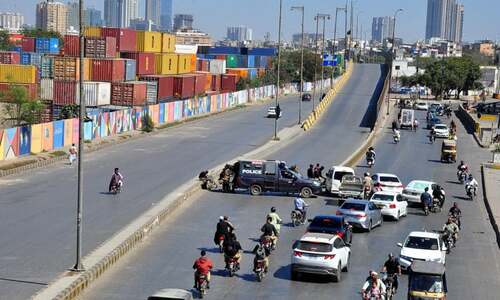KARACHI, July 11: At least nine spots along the Sindh-Balochistan coast have been identified as potential sites that need to be declared marine protected areas (MPAs) in an international paper prepared by the University of Karachi’s researchers. Three main sites recommended for immediate designation as MPAs are the Indus delta, Astola Island and Miani Hor (Sonmiani Bay).
The report says that the status of MPAs for these sites is inevitable to protect the diverse marine flora and fauna facing a direct threat from human activities. The preventive measure would also be in line with the commitment of the government under the International Biodiversity Convention that required the establishment of MPAs in Pakistan.
The suggestion has been made on the basis of case studies on mangroves and their ecosystem, corals and coral reef fish, marine turtles, whales and dolphins, plankton and the pelagic environment that exists in these areas.
The article, Conservation and management of biodiversity in Pakistan through the establishment of marine protected areas, is authored by a team of the KU’s Centre of Excellence in Marine Biology and Institute of Marine Sciences, and has been published in Ocean and Coastal Management this year.
According to the paper, Pakistan exhibits considerable variety in terms of marine flora and fauna, with many commercially important species inhabiting the inter-tidal, near-shore and off-shore areas. Over a period of time, however, many species from these areas have either perished or are on the verge of extinction.
“MPAs would ensure better management of the marine ecosystem and environment. This is also linked with the economic and social stability provided by the sustainable use of resources,” the report says while underlining the need for research on coastal zones, especially on the Balochistan coast, which has remained virtually untouched due to the lack of access and resources.
Identifying the spots that need to be declared MPAs, the report says most of these sites are either Ramsar sites or wildlife sanctuaries. Some of these sites have more than one important commodity that needs to be protected. The sites are: the Indus delta (Ramsar site and wildlife sanctuary), Sandspit/Hawkesbay (wildlife sanctuary), Buleji, Charna Island, Miani Hor (Ramsar site), Ormara (Ramsar site), Astola Island (Ramsar site) and Jiwani (Ramsar site).
Among these sites, the report states, the most important spot may be the Indus delta. On how commercial fishing would benefit from the establishment of MPAs, it says: “The fact that the creeks are sites for fish and shrimp juvenile development and use of katra net (small mesh net) in this area clears the juvenile population from the creeks, it is required to establish pockets of no-take zones (NTZs) along the Indus delta to provide space for juvenile growth while allowing small fishermen to fish in certain creeks.
“Fishery stocks will be enhanced as a result of the MPAs’ establishment by observing regulatory measures and standard fishing practice and by securing potential spawning and breeding grounds. The increase in fish population in NTZs will have a spill-over effect on the adjacent areas where fishermen are allowed to fish. Reduction in fishing activity in NTZs will result in the reduction of accidental mortality of humpback dolphins, which are frequently observed in creeks.”
System under constant threat
The report also highlights the status of mangroves along the Indus delta which are reported to have undergone tremendous destruction in the recent past and the whole ecosystem is under continuous threat from natural and anthropogenic activities. It also focuses on the significance of coral communities that exist at many places along the coast and are at risk due to the industrial development in the coastal zone and upcoming Gwadar Port and the need to protect the beaches of Hawkesbay, Sandspit, Paradise Point, Sonmiani, Gwadar and Jiwani, which are used by endangered marine turtles as nesting grounds.
For the protection of whale and dolphin species, the report says that the presence of endangered and vulnerable whale and dolphin species in the northern Arabian Sea bordering Pakistan makes a strong case for this area to be declared as a marine protected area. However, there appears to be a need for identifying the hotspots of whales and dolphins in Pakistani waters.
The report also stresses the need for research on food web structures and the threats posed to these organisms by pollution and climate change.

































